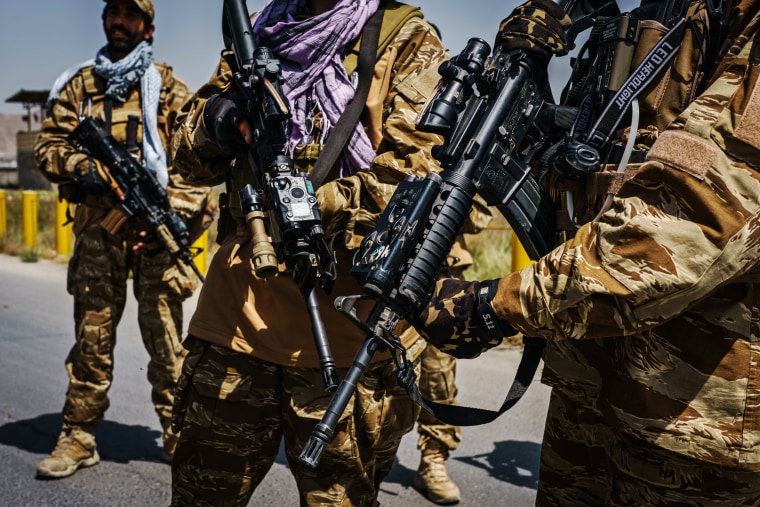GUANTÁNAMO BAY, Cuba — Two decades after the 9/11 attacks put terrorism at the center of American foreign policy, some of the same Taliban figures who harbored the planners of that operation in Afghanistan are back in power, including an interior minister with a $10 million U.S. bounty on his head.
But despite the collapse of the American-backed government in Kabul, many national security experts say the U.S. remains much less vulnerable to international terrorism than it was when New York and the Pentagon were struck.
“Absolutely, we're safer,” Michael Leiter, former head of the National Counterterrorism Center, told NBC News’ Andrea Mitchell.
“We're safer here at home, because we’ve got an integrated intelligence community and law enforcement in a way that we never had, pre-9/11,” he added. “We're safer globally, because we have a network of allies who have similar structure set up. ... None of that means we're safe, but we are absolutely safer than we were 20 years ago.”
President Joe Biden’s counterterrorism adviser, Elizabeth Sherwood-Randall, echoed that sentiment in remarks this week at the Atlantic Council.
“We have learned since 9/11 how to protect Americans from terrorism,” she said. “It isn’t fail-safe, and terrible things still happen. But through a combination of actions abroad and at home, we have thus far been able to disrupt and prevent another 9/11-style attack.”
In the wake of 9/11, the U.S. reorganized its security apparatus and harnessed all the elements of national power to disrupt terrorist plots at home and abroad. Decisions were made to pursue policies, including brutally coercive interrogations and targeted killing, that once were considered out of bounds.

The CIA’s torture program has since been repudiated and outlawed, but politicians from both parties say targeted killings with drones and commandos have remained one of the most successful tactics in the war on terror. What the U.S. once condemned Israel for doing to Palestinian militants became a crucial element of the American toolkit and something Biden said will help prevent Al Qaeda and ISIS from metastasizing in Taliban-controlled Afghanistan.
Over the last 20 years, the CIA and the military have hunted and killed thousands of militants in Afghanistan, Iraq, Pakistan, Yemen, Somalia, Libya and Syria, among other places.
That effort has helped to reduce, if not eliminate, the capacity for the disparate Al Qaeda and ISIS branches to mount a 9/11-style attack.
“While the threat of ‘jihad’ terrorism in the homeland remains, the CIA and its domestic and international partners have significantly degraded the ability of these groups to launch terrorist attacks outside their areas of current operations,” said former CIA Director John Brennan, an NBC News national security contributor.
When intelligence leaders briefed Congress this year on the major threats facing the country, they focused on China, Russia, climate change and pandemics. In the wake of the Jan. 6 Capitol riot, domestic extremism, already of growing concern, received new attention.
International terrorism was scarcely mentioned.
“I think we have to be clear-eyed about the reality,” CIA Director William Burns said, that while “both Al Qaeda and ISIS in Afghanistan remain intent on recovering the ability to attack U.S. targets … after years of sustained counterterrorism pressure, the reality is that neither of them have that capacity today.”
It was the first time a CIA director had said such a thing. And officials said it remains an accurate appraisal of the latest intelligence analysis.
Many experts worry that over the long term, Afghanistan could become a terrorist haven once again and could incubate future attacks.
Without an embassy and bases on the ground, it will be much harder for U.S. intelligence agencies to track the threats there. The drones and other air assets that will fly over Afghanistan airspace to spy and occasionally strike will be coming from far way in the Persian Gulf.
“We talk a lot about ‘over-the-horizon’ targeting of terrorists,” Leiter said. “So we can certainly do that — everyone knows about drones, unmanned aerial vehicles, we have airstrikes, all of those things.”
But they require partnerships with people on the ground, he added, and “losing that presence in Afghanistan will make it harder for us to partner to find those targets.”
The Biden administration said the U.S. will do what it takes to prevent that.
“We have the ability and the means to carry over-the-horizon counterterrorism capabilities, and we’re going to defend ourselves,” Pentagon spokesman John Kirby said last week, after a U.S. strike killed who officials described as ISIS “planners,” after a suicide bomb killed at least 90 people in Kabul, including 13 U.S. service members.
Some experts disagree that the U.S. is safer. Former FBI agent Ali Soufan, who conducted some of the first interviews with Al Qaeda detainees after 9/11, wrote for The Washington Post recently that “the terrorism era is far from over. A new, more dangerous phase has begun.”
“Large swaths of Libya, Somalia, Yemen, Syria, Lebanon and Iraq are all, to a greater or lesser extent, ruled by non-state militias, creating an arc of instability from North Africa to South Asia,” he wrote.
But U.S. spies and commandos have degraded Al Qaeda’s capabilities in many of those places, intelligence officials said, and terrorism motivated by radical Islamist ideology has been declining over the past five years, according to the annual Global Terrorism Index, published by the Australia-based Institute for Economics and Peace.
The 2011 killing of Osama bin Laden, the more recent routing of ISIS from its caliphate and the killing of its leader, and the steady, relentless counterterrorism pressure on those organizations appears to have reduced their appeal. In the U.S. and Europe, far-right terrorist violence has become more common and more lethal than attacks inspired by jihadism.
No one disputes that international terrorism will remain a threat to the U.S. But with China expanding its influence around the world and more than 650,000 Americans dead from the Covid pandemic, many national security officials said the U.S. should resist returning to the near single-minded focus on counterterrorism that has animated American foreign policy for much of the past two decades.
“We need to set priorities and integrate our counterterrorism efforts into a range of evolving national security challenges,” Sherwood-Randall said, “from a more aggressive China, to cyberattacks, to pandemic disease and bio threats.”
CORRECTION (Sept. 12, 2021, 6:55 p.m. ET): A previous version of this article misstated when the Institute for Economics and Peace’s annual Global Terrorism Index was published. It was published in November, not Wednesday.

